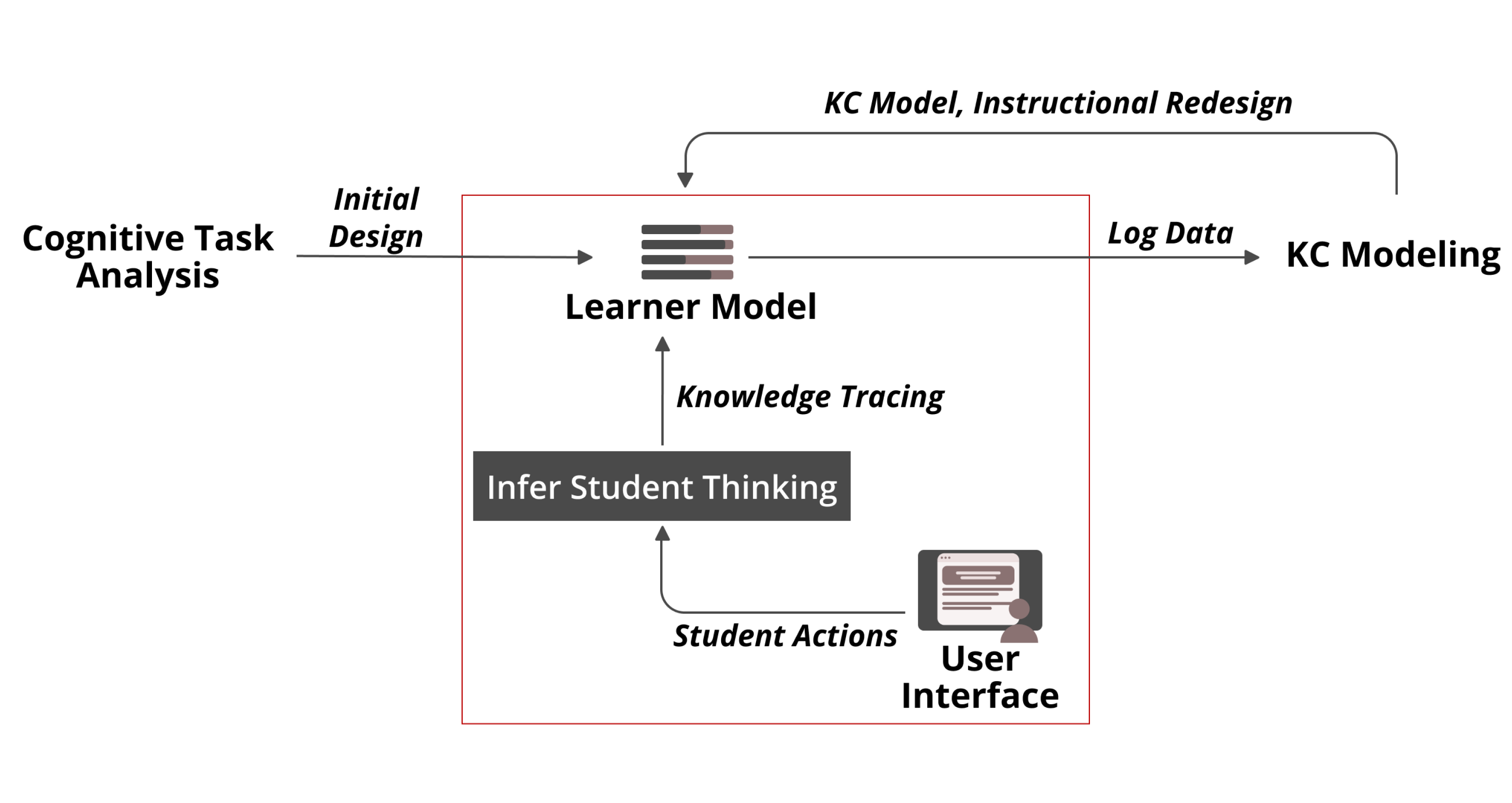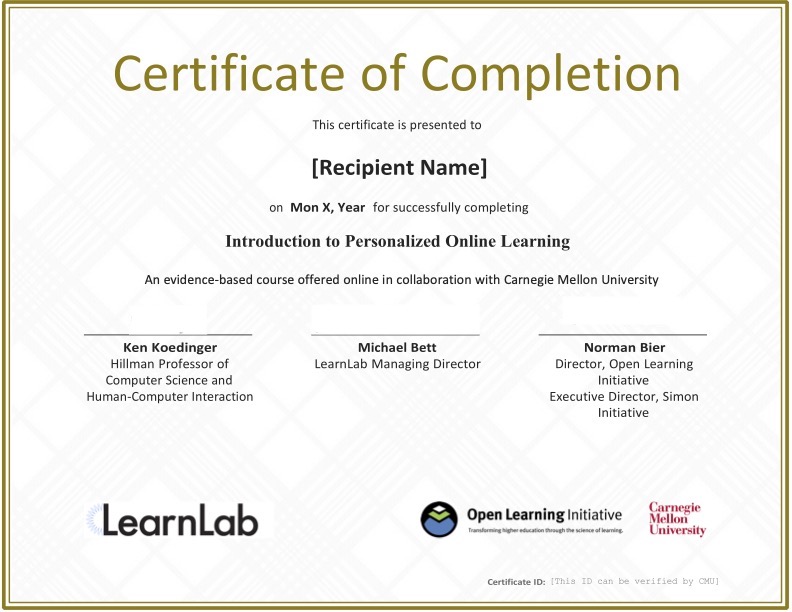Data-driven Knowledge Tracing to Improve Learning Outcomes


Start Any Time
Work on your pace and you will have instructors available to help you answer any questions.

Duration
Approximately 3 weeks, 6-8 hours/week

Fee
$1500 - Professional Rate
$500 - Full-time Student Rate*
Referral & Group Discounts Available**
*Proof of full time student enrollment required. Acceptable forms of ID include a letter from your university’s registrar office or an unofficial transcript. Email your documents to learnlab-help@lists.andrew.cmu.edu.
**Have you taken one of our courses before? Refer a friend or colleague and get 20% off any future course – they’ll get 20% off a course of their choosing, too! Just have the person you refer email us at learnlab-help@lists.andrew.cmu.edu with your name and email address. Contact us about group discounts.
Certificate Course Description:
Collecting and analyzing student data is a critical skill in improving learner outcomes. To see learning, we need to look at a detailed, fine-grained decomposition of knowledge to be learned (called Knowledge Components). We will look into how we can infer an individual student’s knowledge of the KCs in the cognitive model, based on performance. Then individualize the curriculum such that each student can master all KCs at their own pace.
In this course, students will learn to apply data-driven modeling to track students’ knowledge growth in advanced learning technologies and adapt the instructions based on that. They will also be able to apply different techniques to figure out the best KC model for a task via search.
Our team hosts office hours for all courses over Zoom on the 2nd and 4th Wednesday of each month, 10:00 AM – 11:00 AM EDT/EST (4:00 PM – 5:00 PM CAT). On 2nd Wednesdays, Dr. Ken Koedinger, who is the Director of the Masters of Educational Technology and Applied Learning Sciences (METALS) program, will be available. On 4th Wednesdays, you will have the opportunity to speak with our learning engineers.
Module 1: Mastery
- Define ITS instructional features and design space as described by VanLehn
- Describe knowledge component modeling
- Describe Cognitive Mastery (mainly N-Consecutive Correct responses heuristic and Bayesian Knowledge Tracing)
- Predict student performance using Bayesian Knowledge Tracing
- Apply data-driven tuning of cognitive mastery
- Explain how wheel spinning relates to cognitive mastery
Module 2: KC Modeling
- Describe knowledge component modeling
- Explain ways to implement a KC model
- Describe data-driven KC model revision
- Evaluate a KC model with Additive Factors Model (AFM)
Module 3: Cognitive Task Analysis
- Define Cognitive Task Analysis (CTA) and its purpose
- Classify a given CTA based on the type and identify its target use
- Articulate the process of the Think-aloud method
- Articulate the process of the Difficulty Factor Assessment (DFA) method
- Compare advantages of DFA and Think-aloud
Module 4: Learning Factors Analysis (LFA)
- Explain the role of cognitive task analysis in scaling instructional impact
- Explain how to discover a cognitive model via search
- Interpret and generalize the cognitive process
- Describe system redesign in light of a new cognitive model
Module 5: Course Project
At the end of the course, you’ll have an opportunity to do a little project where you will refine a system’s KC model so it better aligns with student learning. That will provide you with a nice experience to apply the fundamentals you will learn in the modules to a larger, more authentic, context. It will be graded by the instructor and you will receive personalized feedback along with a sample solution.
None
Researchers, product/UX designers, and instructional designers who want to develop adaptive and personalized educational experiences. Administrators who want to gain a deep understanding of how personalized learning is delivered. Anyone interested in edtech.
What you'll learn
This course will help you:
- Explain how to implement and predict student performance using Knowledge Tracing Algorithms
- N-Consecutive Correct responses heuristic
- Bayesian Knowledge Tracing
- Explain ways to implement a KC model and evaluate it with Additive Factors Model (AFM)
- Generate an initial KC model and alternative KC model candidates using Cognitive Task Analysis (CTA)
- Discover an efficient cognitive model via search and perform a system redesign in light of a new cognitive model
Course Instructors

Dr. Vincent Aleven
Dr. Vincent Aleven is a Professor in Carnegie Mellon’s Human-Computer Interaction Institute (HCII). He has 20 years of experience in research and development of advanced learning technologies, grounded in cognitive theory.

Dr. Ken Koedinger
is a professor of Human-Computer Interaction and Psychology at Carnegie Mellon University. Dr. Koedinger has an M.S. in Computer Science, a Ph.D. in Cognitive Psychology, and experience teaching in an urban high school. His multidisciplinary background supports his research goals of understanding human learning and creating educational technologies…
Certificate
Upon successful completion of the program, participants will receive a verified digital certificate of completion from Carnegie Mellon University’s Open Learning Initiative.

In addition to the knowledge and immediately applicable frameworks you will gain by attending your selected courses, you will benefit from:
- A digital, verified version of your Executive Certificate (Smart Certificate) you can add to your resume and LinkedIn
- Networking with a global group of your peers and instructors for advancing your career
Register Now
Register and start taking the course in four steps:
1. Enter your name and email address.
2. Register for the course at: https://proton.oli.cmu.edu/sections/join/5j4dk
Have questions? Our learning engineers are here to answer them at our monthly live AMA events! Join us at 4 PM EST on First Fridays, or 10 AM EST on Third Mondays. Registration required.